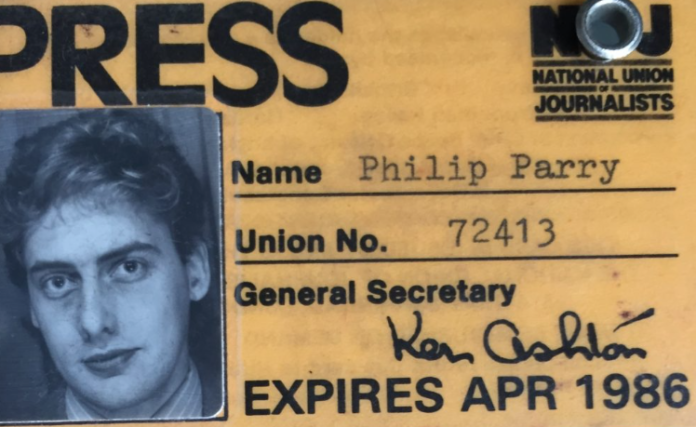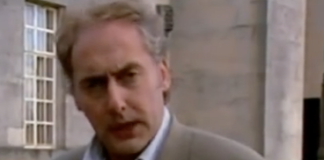- Opposites attract - 26th February 2026
- Upset coffee - 25th February 2026
- Not acting the part - 24th February 2026

During 42 years in journalism (when he was trained to use simple language, avoiding jargon) for our Editor, Welshman Phil Parry (who spent 23 years with the BBC), covering major events which turned out to have vital historical significance was paramount, and new fears are emerging about the biggest one of all – nuclear weapons, because the treaty governing their use by two big powers is about to end.
In today’s Bank Holiday read, he examines this problem.
Some things do not make the headlines as they used to but are no less important – this is shown particularly in the attention given (or NOT given) to nuclear weapons.

As a journalist I have watched this phenomenon develop massively, and it fascinates me.
In the 1980s there were mass demonstrations, with details about them including the arrests which were made, on the television news almost nightly, and membership of the Campaign for Nuclear Disarmament (CND) hitting new highs.
Now though the issues have faded from view.

The end of the cold war has appeared to make it all seem so remote as to be not worthy of scrutiny, because the number of nuclear weapons has been enormously reduced and the risk of using them is far less.
On the other hand expensive weapons which can kill millions STILL exist, the man in charge of the country with many of them is an erratic populist, and, perhaps most worryingly, the treaty limiting their use between the United States of America (USA) and Russia is about to run out.


This is called New START, and it will expire in February, with no replacement in sight, and in the context of what is happening in the world today, this is extremely alarming.
For example Russia has repeatedly threatened to use nuclear weapons, and China is fast building up its arsenal.
China will have perhaps 1,000 warheads by the end of the decade, according to the Pentagon, while the USA and Russia have about 5,000 each.
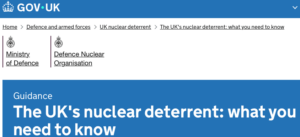 As a much smaller (although still deadly) nuclear power, the UK Government is in no doubt about the importance of having these weapons, proclaiming on its website: “The risk of nuclear conflict remains remote, but the threats the UK faces are increasing in scale, diversity and complexity. That is why we must be able to deter the most extreme acts of aggression against us and our NATO allies.
As a much smaller (although still deadly) nuclear power, the UK Government is in no doubt about the importance of having these weapons, proclaiming on its website: “The risk of nuclear conflict remains remote, but the threats the UK faces are increasing in scale, diversity and complexity. That is why we must be able to deter the most extreme acts of aggression against us and our NATO allies.
“The UK has taken a consistent and leading approach on nuclear disarmament but not all states have followed. Some are significantly increasing and diversifying their nuclear capabilities. We must ensure they can never use their nuclear weapons to threaten us, constrain our decision making, or sponsor nuclear terrorism.”
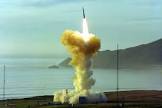
Let’s look at what is happening across the pond because it is very instructive.
America is modernising all parts of its ‘triad’ of land-, sea- and air-launched nuclear weapons, parts of which are half a century old.
Minuteman III ICBMs (Intercontinental Ballistic Missiles) will be replaced by Sentinel; B-2 bombers will become B-21s; and the Ohio–Class Ballistic-Missile Submarines (SSBNs) will make way for the Columbia-class subs.


The most contentious element of this arms increase is the Sentinel programme, whose cost has hugely exceeded its budget, raising serious questions.
In 2024 the estimated costs of Sentinel jumped to $141 billion, more than 80 per cent higher than the previous projection.
America’s ICBM infrastructure is vast, with 400 missiles deployed in 450 silos across the great plains.
A spider’s web of cables connects them to 45 ‘Missile-Alert Facilities’ (MAFs), each consisting of a peanut-shaped capsule below and a support-building ‘topside’ above.
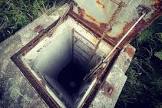
Wales, of course, is not immune – either as a target or as a place of (possible) refuge in the past (and perhaps the future too).
Decaying nuclear bunkers are all over the place.
One in Cardiff has been given Grade II listed status, with the heritage body Cadw saying the Llandaff Sub-Control Centre was a sobering reminder of how close Wales came to nuclear annihilation in the 20th Century.
But what about now? Could these bunkers be put back into commission?

So just because things are not in the news any more, does NOT mean they have lost their significance.
You can only be killed once…
The memories of Phil’s astonishing, decades long award-winning career in journalism (when major events loomed large) as he was gripped by the rare neurological disabling condition Hereditary Spastic Paraplegia (HSP), have been released in a major book ‘A Good Story’. Order it now.
Tomorrow ‘Information overload again’ – where The Eye show how a warning from the Deputy First Minister of Wales (DFMW) a controversial force will take action against law breakers, as well as a key revelation that the police solve hardly any crimes, highlight disturbing details exposed by The Eye about the biggest one in Wales.








